ORLEANS — Farmers tilling the soil on large plots of town-owned land at Putnam Farm, just off the Route 6 rotary, range from enthusiastic first-timers interested in producing their own organic vegetables and herbs to experienced gardeners who are frequently tapped by those newcomers for advice.
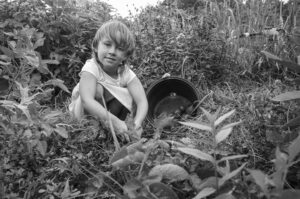
The farm provides a way to sustain the town’s long agricultural heritage at a time when farmland is being lost to development at a frightening pace. According to the Mass. Dept. of Agricultural Resources, the state lost almost 60,000 acres of farmland between 1997 and 2017. Another 78,000 acres are expected to be lost by 2040. Barnstable County’s farmland is already under 2 percent of its total land area.
The state’s Farmland Action Plan, published in January, includes recommendations for permanently protecting farmland over the next 25 years. Among those is the use of state and municipally owned land for farming.
While Putnam’s growers are all ages, most are younger than Barnstable County’s median of 55 years. “If you’re looking for 30-somethings on Cape Cod, they’re right here,” said Rick Francolini, an active volunteer at Putnam Farm.
Putnam is unique in a few ways. Generally, when towns purchase conservation land, agriculture isn’t on the list of allowed uses, but the primary driver behind the purchase of Putnam was to permanently preserve a portion of the historic farm for agriculture. The purchase was approved unanimously at a town meeting in 2010.
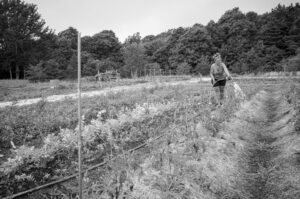
Drusy Henson, chair of the Orleans Conservation Commission, which oversees the property, said that leasing large plots to growers is a good way to support local agriculture. “Farmers don’t have a lot of money,” she said. “They can’t afford to buy land.”
She couldn’t think of another town in the state with a similar arrangement.
It recently caught the attention of Ashley Randle, commissioner of the Dept. of Agriculture Resources, who plans to tour the farm with local officials next month. “MDAR is interested in learning more about this innovative collaboration between the town and the farming community,” a spokesperson said.
Putnam’s Growers
While a typical community garden offers small plots to hobby farmers at a nominal fee, which Orleans does at two other locations, Putnam provides opportunities for more ambitious ventures.
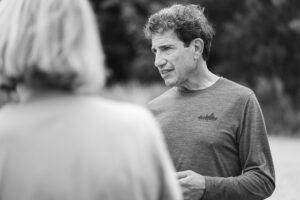
The plots, each 50 by 70 feet, are available by lottery to anyone living in the state for an annual fee of $500. Opening it up to all Mass. residents was a requirement of the state’s Local Acquisitions for Natural Diversity (LAND) grant, which helped cover the purchase. Several of Putnam’s growers sell their produce at farmers markets and to local restaurants. They also supply community-supported agriculture programs, according to Francolini, providing them with an important source of income and the region with locally grown produce.
The town is an active partner. This year, eight new plots were ready for cultivation, bringing the total to 20, and an irrigation well went online with piping to all the plots. When it came time to assign the new plots, 30 hopefuls entered the lottery. Currently lessees come from communities stretching from Truro to West Barnstable, Francolini said.
Paige Sullivan, a teacher at Orleans Elementary School, entered the lottery but didn’t win. That’s for the best, said Sullivan. As a first-time grower, she would probably have found she wasn’t equal to the challenge of cultivating 3,500 square feet. The conservation commission stipulates that 75 percent of a plot must be in use for a lease holder to keep it.
Sullivan and her husband, Brendan St. Peter, were able to join a group of local teachers and their friends led by Rand Burkert, who was awarded a plot this summer after the previous lessee moved from the area. Sullivan said she is learning a great deal from Burkert, an experienced grower who teaches at Nauset Middle School, and Tom Farkas of the Master Gardener Association of Cape Cod. In one area, the group is using the traditional Wampanoag “three sisters” method of growing corn, beans, and squash set up in mounds, guided by Burkert.
Cape Cod native Jessica Rempel grew up gardening with her mother. Her husband, Dave, did a lot of farming growing up in Canada. The couple now lives in Wellfleet and was awarded a Putnam plot in the recent lottery. This season, they planted a long list of vegetables as well as some herbs.
“We went with what we knew, taking it as a learning experience, but it’s going great,” Rempel said. With an eye toward the future, they planted one area with a “cover crop” of partridge peas, a wildflower that Rempel called “a nitrogen fixer,” which will improve soil quality.
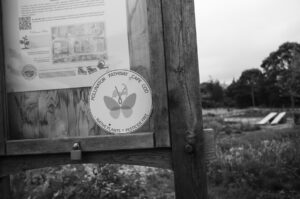
While most growers lay out their crops in rows, a plot leased by Molly Tsongas and Natalia Redyk was designed in concentric circles that emanate from a central gathering area. Tsongas designed the plot, while Redyk had the farming know-how. This marks their third year growing.
“I wanted it to feel like a sacred space where people felt included — a place to rest and integrate and learn,” said Tsongas, who was there with some of this year’s growers one day last week. “This year, we’re almost entirely LGBTQ growers.”
Their lush plot is a visual feast, with the greens of the vegetables and herbs contrasting with patches of brightly colored flowers sown to draw pollinators. The harvest is shared with friends and family members. Surplus food is donated to Food Not Bombs, said Tsongas.
The land was cleared by volunteers and the town’s public works dept. The DPW has provided hundreds of truckloads of organic compost, which it heats to get rid of weed seeds and soil contaminants. The department also provides wood chips that the gardeners use between rows to discourage weeds.
A substantial donation from residents Hardie and Marcie Truesdale helped pay for the restoration of two wetlands adjacent to the farm plots.
The town has tapped the expertise of Mass Audubon, the Natural Resource Conservation Service of the U.S. Dept. of Agriculture, the Xerces Society, and the Association to Preserve Cape Cod. Experts helped with the design of the irrigation system and development of a planting plan for the new wetlands.
New Rule for Dogs
Recently it became evident that farming and free-running dogs are not a good mix. In addition to the agricultural lots, Putnam has about eight acres of open land with a network of trails.
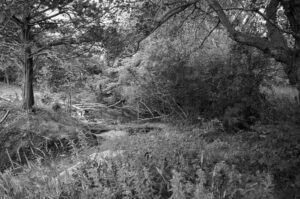
The town’s regulations allow dogs at Putnam if they are under the control of their owners, but a couple of farmers complained that their crops had been trampled by dogs running loose.
Growers can fence in their plots, but because of the cost only three have done so.
At the conservation commission’s June 18 hearing, members discussed options from maintaining the current rules but beefing up the signs to banning dogs. Members also considered a requirement that dogs be on leashes in the growing and new wetlands areas.
Peter Jensen, chair of the agricultural advisory council, told the commission that several of Putnam’s growers sell their produce commercially and invest significant money in their ventures. A dog racing through a plot can quickly cause a great deal of damage. While there are several places in town where owners can take their dogs, said Jensen, there aren’t a lot of places to do commercial growing.
When the final vote was taken, members agreed that dogs visiting Putnam Farm must be on a leash at all times. Signs stating the new rules were expected to go up last weekend.
